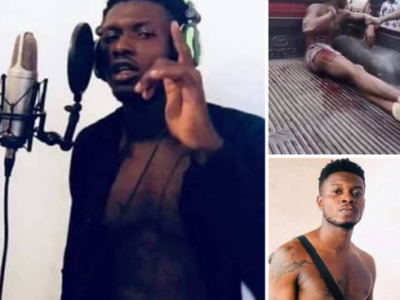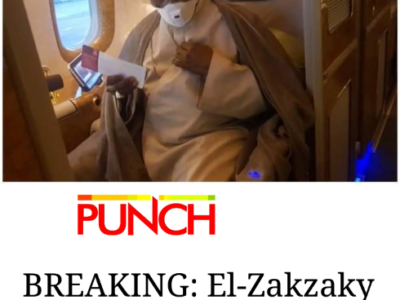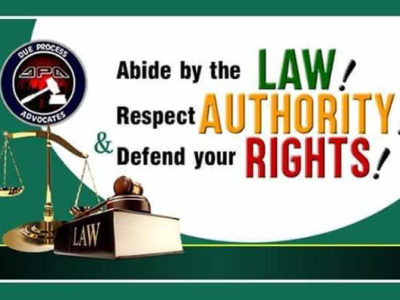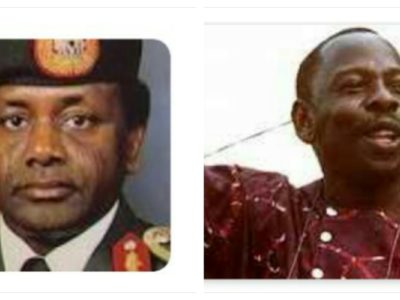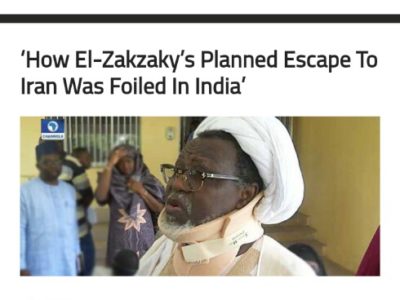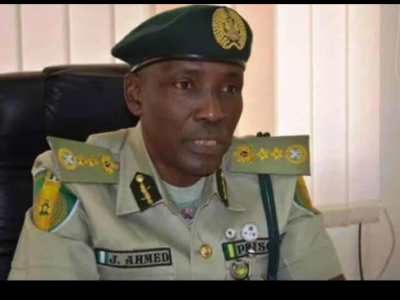Who will cry for the police?
A Facebook user, Angela Chukwuoma Nnaluo, reported a chilling case of police brutality and cold-blooded extra-judicial execution.
An innocent young artist, Chinedu Obi, was reported to have been cruelly murdered by the police in Ogun State. Nobody is crying for this young man. But the police want everybody to cry for them when they suffer the same fate in the hands of a group with superior firepower.
According to Nnaluo:
The story of Chinedu who was arrested, shot and bleed to death, for having tatoo on his body.
"Chinedu Obi, a graduate of University of Port Harcourt and a musician with the name Zinquest.
He came to visit his friend and he was accosted by the Police at Sango Ota because of the tattoos in his body, if anyone knows how the thieves, bandits, rogues and hardened criminals we call Nigeria Police especially at that Sango Police, Station Ota, harrass and rob people in the name of looking for Yahoo boys, you'll understand the frustration Chinedu would have faced and he protested but he was shot.
Chinedu then lost it and got enraged, obviously he had phycological issues and probably drunk too, he was alleged to have destroyed windscreen of some cars around with an axe he was also saying he'll fight back which he shouldn't have done but in all these he wasn't supposed to be left to bleed to death.
He even requested to speak to his father but some satanic and demonic Nigerians including the police were cursing, ridiculing and mocking him in Yoruba language.
Few weeks ago, a Nigerian broke the windscreen of cars at the Nigeria High Commision in London. He was arrested and charged to court. Obi Chinedu allegedly did the same at Sango Ota, Ogun state. He was shot and left to bleed to death.
This is the difference between living in a nation with human beings who think rationally and living in an insane nation like zoo and jungle shithole Nigeria full of mad animals, thieves, rogues, hardened criminals and fantastically corrupt nitwits. What a shame!."
His crime was that he had tattoos.
His crime was that he had an iPhone.
His crime was that he wore a gold chain.
His crime was that he broke car windscreen after he was illegally arrested and daredevil Nig. Police shot him and watched him bleed to death.
NOTE: The same police force that could do this cannot hope for the sympathy of the people when their officers get killed.
The pictures below show Chinedu Obi and the tattoos that was his only crime.
El-Zakzaky, what happened?
Less than four days of arriving in India with his wife for their heavily litigated leave for medical treatment, Sheikh El-Zakzaky and his wife are on their flight back to Nigeria. The treatment hardly took off before it was canceled.
The question on every lip is: what happened? What is the effect of this on the health of the Sheikh which was said to be seriously fragile?
The development is trailed by allegations and counter allegations. The representatives of the Islamic Movement of Nigeria (IMN) accuse Nigerian Government of frustrating the Sheikh's treatment in India by making life unbearable through extremely restrictive conditions which the Indian authorities agreed to enforce. In counter, the Nigerian Government accuses the Sheikh of sabotaging his own treatment by making impossible demands such as wanting to be accommodated in five-star hotel with unrestricted access to visitors.
This difficulty is not totally unexpected. This is the first time a Nigerian court would be granting a criminal defendant leave for medical treatment overseas. This underscores the fact that the court did not grant Sheikh El-Zakzaky bail. Instead, it granted him permission to receive treatment overseas. That gave rise to the need for conditions that restricted his movement. If he was granted bail, the conditions would not have been too restrictive and suffocating.
DPA News was reliably informed that the source of tension that scuttled his medical trip to India was the attempt by the Indian authority to enforce the conditions imposed by the Nigerian court, especially as regards restriction of access to visitors. If this were happening in Nigeria, there would have been flexibilities and wider discretion on the part of those charged with enforcing the conditions. But the Indians must have approached the order the way they would in India. But in India, probably, no court would have given such conditions. No wonder the Sheikh was reported as saying that the restrictions on him in India were worse than what would be the case in Kirikiri Prison.
In the end, this was a storm destined to happen. Who knows what happens next? We believe that upon his return to Nigeria, he will plan another medical trip to a different country with a possible variation of the conditions.
Do you want to know the truth about the Nigerian police?
If you do, watch the YouTube video below. The man that made the video is presently detained in the prison because the police tried to silence him. So, they fabricated an impossible murder charge against him.
DPA members, friends and associates must make this video go viral. Emeka Ugwuonye is a prisoner of conscience. His only crimes was that he condemned the police for corruption and extra-judicial killings of the innocent.
https://youtu.be/zqQbtuDbRvQ
There is a grave danger in hiring a crusader as your lawyer
I look back on the final set of events that led to the execution of Ken Saro Wiwa and others. When you are dealing with a dictator or a repressive regime, you have to be careful how you dare such regime. Having a just cause or a fine argument is never enough. You have to realize that you are dealing with a ruthless and determined regime. Then you make up your mind whether you want to live or to become a martyr.
It is important to remember that if you face martyrdom through a court of law or a tribunal, you are not the person speaking for yourself. It is your lawyer speaking for you. Your lawyer is making decisions about whether you're to live or to die. Make sure you have a lawyer who has no other interest but how to keep you alive. Daring a dictator is dangerous unless you want to be a martyr. The consequence could be tragic.
Ken Saro Wiwa was convicted by a tribunal under General Abacha. The same kangaroo tribunal had on a previous and unrelated case convicted General Zamani Lekwot (Rtd) over the Zango Kataf civil strife that caused death.
Once Lekwot was convicted, he appealed his conviction. Under the relevant decree, appeal lay to the Armed Forces Ruling Council, which was essentially an appeal to the Military . That council considered the appeal and reversed the conviction by the tribunal and reduced the sentence to life imprisonment, and eventually release. Lekwot's life was spared.
When Ken Saro Wiwa was convicted by the same kangaroo tribunal, Wiwa was angry and upset. He was totally obsessed with the righteousness of his cause and his total innocence. Wiwa was an innocent man fighting against a brutal conspiracy and exploitation of his people by the Military Government and Shell oil company. Wiwa refused to appeal the conviction because he was so sure that the tribunal had no moral right to try him, how much less convict him. And Wiwa was right.
Another thing: Wiwa and General Abacha were well known to each other and were friends. If you recalled, General Abacha served in Port Harcourt for a long time, as the Commanding Officer in charge of the Sixth Division in Port Harcourt. So, he and Wiwa had met on many occasions and became friends. They both shared the same idea of abandoned properties, whereby Igbos were forced to lose their properties in Port Harcourt. Wiwa did not believe that Abacha would approve his conviction or sign his execution.
A number of things were happening around that time. General Obasanjo had just been convicted of plotting a coup against Abacha. They were going to execute Obasanjo. But there was too much pressure from all over the world for the life of Obasanjo to be spared. Andy Young led this pressure from America and the newly elected President Mandela led it from South Africa. Indeed, Mandela sent his deputy, Tagbo Mbeki, and some of his cabinet ministers to Abuja to plead for Obasanjo. Abacha and some of his top Generals were in meeting with the South African delegation till 4:00am. Finally, Abacha gave them his word that General Obasanjo and those convicted with him for the alleged coup would not be executed.
Less than five months after the decision not to execute General Obasanjo, Ken Saro Wiwa's conviction came for confirmation before the Armed Forces Ruling Council. There are a few things to note here. After Wiwa was convicted, his lawyers began to make a lot of public speeches condemning the tribunal. They did walk out of the tribunal a number of times. They spoke of how they would mobilize the international community to prevail on Abacha not to carry out the execution of Wiwa. Also remember that Abiola was in detention at the time. Abacha was faced by a personal sense of insecurity. He was afraid of being perceived to be too weak. For the first time, Nigeria just spared the lives of those convicted of coup. And the issue of Abiola was still hanging over him. He felt a need to appear strong and fearless.
On the day the council was to deliberate on the conviction of Wiwa, Abacha seemed indifferent. He was not particularly keen on executing Wiwa. He allowed the other members of the council to take their turns to speak. Most of them felt that Wiwa was just a stubborn rabble rouser, that there was no need to execute him. But they also commented on the fact that Wiwa was too stubborn and that he refused to appeal his conviction. They also felt irritated by the threats to mobilize the international community being issued by Wiwa's lawyers.
When it was the turn of Naval Chief Mike Akhigbe to speak, he was visibly upset about the perceived arrogance of Wiwa and his lawyers. He spoke for a long time. As if he was reading the mind of Abacha, Akhigbe warned that the government was being perceived to be too weak. He reminded them that they just pardoned coup plotters and that they would be taken for granted if they kept pardoning people who threatened them with international community. He queried why Wiwa kept calling them junters and refused to appeal the conviction.
As Akhigbe spoke, it was clear that Abacha was fully tuned in and was nodding in approval to every word he uttered. Indeed, after Akhigbe had made a strong case for the regime to use Wiwa case to send a strong message that the government was neither weak nor afraid, other Generals who had spoken earlier raised their hands and when given the chance to speak again all shifted toward Akhigbe's tone. That was how it was voted that Wiwa be executed.
By 5:00am when the executioners came to execute Wiwa that day, Wiwa did not believe it. He didn't think it was going to happen. His lawyers said there was going to be international community that would prevent any executions.
There is one thing you will notice about those who speak too much about the international community. They are usually people who have never lived for long outside Nigeria. All they know about the international community is what they read in the outdated books or imagined about how the international system works. Nobody is coming to intervene in Nigeria. No international community intervened in Rwanda. During the Nigerian civil war, the Biafrans believed they were going to get international support. But all they got was Red Cross and the Catholic Caritas. The few countries that supported such as France, Gabon, Ivory Coast were only interested in taking Biafran refugees.
As one watches Sowore case and the same type of people speak of what the international community would do or not do, one remembers Ken Saro Wiwa's case. Of course, you cannot compare Sowore with Ken Saro Wiwa. That will be an insult to the memory of Wiwa. But the message still holds that only an unwise person dares a government like Buhari's government. It is like standing in front of a moving train because you are convinced it is moving on the wrong track. I'm not a supporter of Buhari administration. But it will be stupid not to realize that planning a revolution against his government is giving his government an excuse to wiwarize you.
Emeka Ugwuonye
October 2019
FAKE NEWS: Story about the foiling of El-Zakzaky’s plot to escape to Iran is false.
Impossibility is one of the strongest test of truth. The fact that what a person is accused of doing is indeed impossible is a valid proof that he did not do it.
This report from a suspicious news website, which tries to impersonate the Aljazeera news network, a propagator of Sunni Muslim interest is peddling the fabrication that El-Zakzaky had planned to escape to Iran, but was stopped by his Indian doctors.
It is impossible how El-Zakzaky could expect medical doctors to aid him in such escape mission. Even the distance between India and Iran were a short dash, it will still be highly improbable that doctors are in a position to execute such plan.
You need people in the aviation and probably the Indian Air Force to achieve such feat.
Nigeria enacts a new law on prisons
With the passage of the Nigerian Correctional Service Bill into law the Prisons Service changes name to Nigerian Correctional Service.
President Muhammadu Buhari has signed the new law into force on 14th August, 2019. The new law is intended to enable some critical reforms in the Nigerian prison system far beyond a mere change of name.
It underscores the global movement away from the emphasis on punishment to correction as the guiding philosophy behind incarceration of people who violated the criminal laws of the country. When the court finds a person guilty and hands him over to the prison authority, the expectation of society is not for punishment. Instead, the idea is that the person is handed over to the prisons authority so that they would reform him to a point where the person can return to society as no more a danger to society.
The emphasis on punishment is outdated. It depicts the society as vengeful and vindictive, when all it should be seeking for is to reform the criminal. Emphasis on correction is positive and forward looking. It is focused on what the person becomes at the time he is released back to society, while to focus on punishment is to focus on what happens to the person during the time he is incarcerated without regard to the aftermath.
Also, the new law which repeals the Nigerian Prisons Service Act, has other reform agendas in mind, including the decongestion of prisons (now to be called corrections). One way the government seeks to achieve decongestion is the new rule that condemned criminals who have served up to 10 years will have their sentences committed to 10 more years. This is automatic removal of executions, unless the person is executed within 10 years of sentencing. The way this rule is intended to work is not yet clear. DPA News needs more time to study the new law.
One nagging problem about prison congestions has nothing to do with the prison law. Rather, it has everything to do with a judiciary that is inept, corrupt and dysfunctional. Over 80% of Nigerian prison inmates are awaiting trial. These are people the judges refused to grant bail in clear violation of the Constitution of the country. There will be no change in the rate of prison congestion unless reform is aimed on how to reduce the number of awaiting trial inmates.
With the signing, the Nigerian Prisons Service will now be called the Nigerian Correctional Service, and prisons shall now be called Corrections.
The picture here is
Comptroller General, Nigerian Correction Service, Mr. Ja’afaru Ahmed

